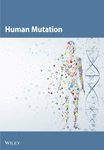Prevalence of small rearrangements in the factor VIII gene F8C among patients with severe hemophilia A† ‡
Communicated by Peter Humphries
Online Citation: Human Mutation, Mutation in Brief #533(2001) Online http://www.interscience.wiley.com/humanmutation/pdf/mutation/533.pdf
Abstract
Hemophilia A is a common X-linked bleeding disorder caused by various types of mutations in the factor VIII gene F8C. The most common intron 22-inversion is responsible for about 40% of the severe hemophilia A cases while large deletions, point mutations and small (less than 100 bp) deletions or insertions are responsible for the disease in the rest of patients. We report on nine novel (6 deletions, two indels and one partial duplication) and five recurrent small rearrangements identified in 15 German patients with severe hemophilia A, negative for the intron 22-inversion. c.2208-2214delTTATTAC/c.2207-2215insCTCTT and c.4665-4678del/c.4664-4678insAAGGAA identified in the present study are the first small indels described in the factor VIII gene. Our analyses suggest that the prevalence of this type of mutations (predominantly located in exon 14) among patients with severe phenotype and negative for the common intron 22-inversion, is about 30%. The correlation between these molecular defects and formation of factor VIII inhibitors as well as the parental origin of the de novo mutations are evaluated. Finally we show that denaturing HPLC (DHPLC) and classic heteroduplex analysis (HA) are able to detect these sequence alterations on 100% and could be preferred as a screening approach when analysing for mutations in factor VIII in severely affected patients. © 2002 Wiley-Liss, Inc.




